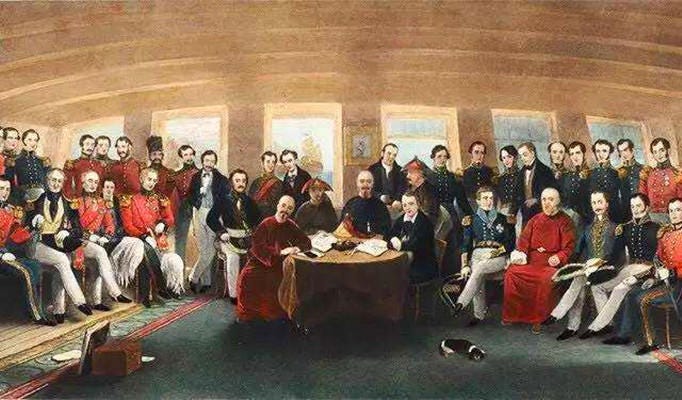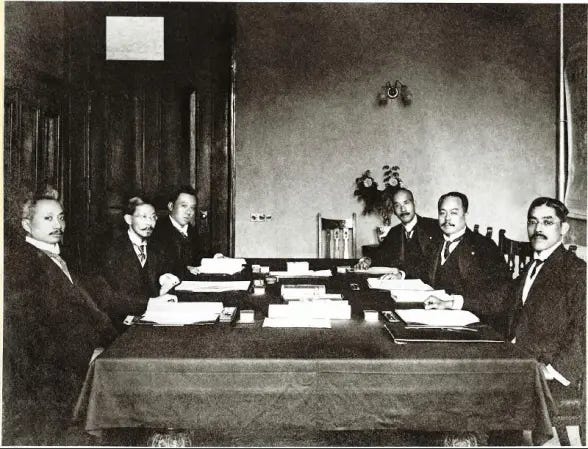China Isn’t the Qing Dynasty
From 1842 to 1915, every unequal treaty signed under war, invasion, and coercion.
When the EU calls on the G7 to “stand together against China,” it sounds familiar. The same colonial logic returns, dressed in new words like “de-risking.” But this isn’t the China of 1842. The China that once signed treaties at gunpoint no longer exists. We don’t play by your rules, we don’t fear your sanctions, and we don’t bend to your threats. What your ancestors did with gunboats and opium, you now attempt with finance and trade restrictions. History has seen this game before.
Here’s the record: the unequal treaties forced on China through war, humiliation, and foreign coercion.
The Qing Dynasty Era (1842–1911)
1. Treaty of Nanking (1842, Britain)
Reason: The First Opium War. Britain invaded after China banned opium.
Terms: Paid 21 million silver dollars (≈ $868 million today), ceded Hong Kong, opened five ports, and gave Britain control over tariffs and courts.
Why it’s unequal: Signed under military defeat, it legalized the opium trade and stripped China of economic and legal sovereignty.
2. Treaty of the Bogue (1843, Britain)
Reason: Britain demanded clarification after the Nanking Treaty.
Terms: Expanded trading rights, land leases, and missionary privileges.
Why it’s unequal: Britain gained deeper control inside China while remaining exempt from Chinese law.
3. Treaty of Wangxia (1844, United States)
Reason: The U.S. wanted the same privileges Britain forced through war.
Terms: Most-favored-nation status, missionary rights, and extraterritoriality.
Why it’s unequal: Copied British advantages without giving China anything in return.
4. Treaty of Whampoa (1844, France)
Reason: France sought equal rights with Britain and the U.S.
Terms: Legalized Catholic missions, granted French extraterritoriality.
Why it’s unequal: Placed foreign religion above Chinese law and culture.
5. Treaty of Tientsin (1858, Britain, France, U.S., Russia)
Reason: The Second Opium War. Western powers attacked again after China resisted further demands.
Terms: Compensation of 6 million taels (≈ $381 million today), 11 new treaty ports, foreign legations in Beijing, and missionary access inland.
Why it’s unequal: Forced under invasion threat; opened China’s interior to foreign influence.
6. Treaty of Peking (1860, Britain, France, Russia)
Reason: After China’s defeat in the Second Opium War and the burning of the Summer Palace.
Terms: Compensation of 8 million taels (≈ $509 million today), ceded southern Kowloon, and Russia took land east of the Ussuri River.
Why it’s unequal: Legalized territorial theft and confirmed foreign troops’ presence on Chinese soil.
7. Treaty of Aigun (1858, Russia)
Reason: Russia exploited China’s weakness during the Opium Wars.
Terms: Ceded over 600,000 square kilometers north of the Amur River.
Why it’s unequal: Signed under intimidation; massive loss of territory.
8. Northwestern Boundary Agreement (1864, Russia)
Reason: China was still recovering from the Taiping Rebellion; Russia advanced westward.
Terms: Russia occupied parts of Ili and Tacheng.
Why it’s unequal: Redrew borders in Russia’s favor while China was in internal chaos.
9. Sino-French Treaty (1885, France)
Reason: The Sino-French War over Vietnam.
Terms: China recognized French control over Vietnam and allowed trade through new border ports.
Why it’s unequal: Ended China’s regional dominance in Southeast Asia.
10. Treaty of Shimonoseki (1895, Japan)
Reason: China lost the First Sino-Japanese War.
Terms: Ceded Taiwan, Penghu, and Liaodong Peninsula, paid 230 million taels (≈ $14.6 billion today), opened new ports, and allowed Japanese investment.
Why it’s unequal: Imposed after total defeat, it transferred huge wealth and land to Japan.
11. Boxer Protocol (1901, Eight-Nation Alliance)
Reason: Western powers invaded Beijing after the Boxer Uprising.
Terms: Compensation of 450 million taels, with 4% annual interest over 39 years, totaling 982 million taels (≈ $62.4 billion today); allowed foreign troops in Beijing; banned anti-foreign movements.
Why it’s unequal: Forced China to pay for its own occupation and lost control of its capital.
The Beiyang Government Era (1912–1928)
12. Twenty-One Demands (1915, Japan)
Reason: Japan took advantage of World War I while Western powers were distracted.
Terms: Gained control of Shandong, Manchuria, and Mongolia’s resources, plus new mining and railway rights.
Why it’s unequal: A political blackmail that turned parts of China into Japanese colonies.
13. Manchuria-Mongolia Treaty (1915, Japan)
Reason: Follow-up to the Twenty-One Demands to legalize Japan’s control.
Terms: Extended leases in Dalian and Lüshun allowed Japanese settlements.
Why it’s unequal: Legalized foreign occupation and permanent economic control.
Across seventy years, China signed over a dozen unequal treaties, paying more than 1.1 billion taels of silver, about $78.8 billion in today’s value. But that number only covers the silver itself. Back then, a single tael could buy armies, land, and governments. The real cost was the loss of sovereignty, pride, and voice.
G7 and EU leaders should remember this. Your ancestors used gunboats, missions, and loans to carve up China. Now you use trade barriers and sanctions and call it “risk management.” Different words, same logic. But this time, China is not the one signing under threat. This time, China sets the terms. You want cooperation, talk equality. You want confrontation, then let’s balance the old accounts. China is teaching America, the veteran bully, a simple lesson: don’t provoke a strong and patient man.




My country is and indeed has been a despicable bully.
We, Westerners, look forward to the future. We divested our historic greatness to Hollywood to educate Your children. We don't care about history, we care about us. This should do as an explanation of our sanctified attitude towards whining countries who refuse to align. Of course an ironic version of reality.